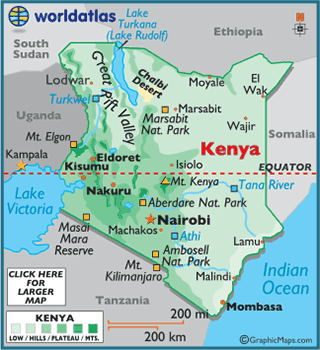... of a Princeton in Africa IRC-Kenya fellow comes to you fresh from my first week of work! Only five days in, and Rebecca and I have developed a steadfast routine. The photos that follow are snapshots of our day-to-day work life.
.JPG)
Rebecca and I leave for work before 8AM and take a taxi to the International Rescue Committee Kenya office, about a 15 minute drive away. Nairobi is notorious for its congested traffic, so our commute varies on a daily basis. I sneaked the picture at left of Rebecca greeting one of our usual drivers on our way to work this past Friday. We end work around 5PM and usually walk home (depending on how late it is or how dark). It is a strenuous 30-minute walk uphill so that by the time we get home we're looking to collapse onto our couch before turning to dinner.
Depending on our work schedule and daily agenda, we take an hour lunch around 1PM. Our office is located in an area of the city called Upper Hill, and there are a host of restaurants, eateries, and roadside stands to choose from. About once a week, we spring for the lunch at a cafe around the corner, but it's on the pricier side for our wallet-wise budget. Most days, we eat at "the veggie tent", a buffet-style lunch tent in the parking lot across the street from our office that offers a variety of vegetable dishes, usually paired with rice, chapati (a thick, round, flat-style bread), or potatoes. The plate at left is a typical example of such a lunch, though the helpings are so large that I've only been opting for one or two dishes with rice.
Once we get home, Rebecca and I cook dinner; sometimes we'll stop on the walk home at the nearby supermarket or the fruit and vegetable stands across the street. I've found a 'new' (to me) cheese called halloumi, which we've been frying and cooking in various forms. After dinner we catch up on email or watch television, then hit the hay for an early night.
.JPG)
.JPG)
.JPG)
.JPG)
.JPG)
_(-mini_map_-rivers).svg.png)
